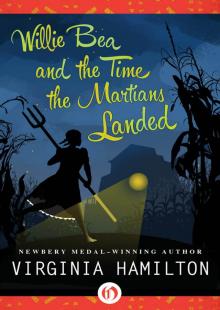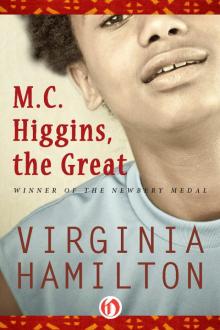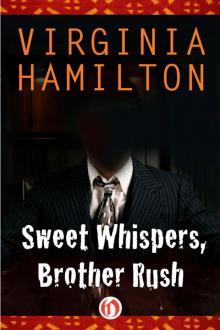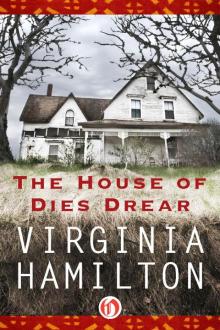- Home
- Virginia Hamilton
M.C. Higgins, the Great Page 5
M.C. Higgins, the Great Read online
Page 5
“He’ll make it all right,” M.C. told himself, and then: “Hope that girl gets lost.” He studied the hills, but could see no one, not even a glint. “Then I’ll have to find her and lead her by the hand.” Smugly he turned his face to the sky and swung his gleaming pole into the stifling air.
3
M.C. CALLED AN ODD, impelling yodel over to the lake in the cirque about a minute before the steel mill whistle blew for lunch.
“Yad’dlo! Yo’dlay-dio! D’lay-dio!”
He gave it off with time enough for it to echo around the hills. He knew it was a peculiar sound and hoped the dude out there somewhere could hear. Get an idea of how his mama would sound. M.C. hurt his throat, too, pitching the yodel high and loud enough to outdistance the sounds drifting from the river and out from Harenton.
Other yodel cries echoed ordinary, as commonplace as horns of river boats. Mothers calling their children home and children yodeling sassy, answering back. Only M.C.’s yodel seemed to spread out over the hills with a rolling, yearning minor cadence. It caused his brothers and sister to pause. From the cirque, they looked over to Sarah’s Mountain.
M.C. swept his arm slowly out and back to his chest, motioning the children home. He wasn’t certain they could see him in the midst of the trees. But he could see them. He saw his sister, Macie Pearl, stamp her feet and shake her legs like a young pony ready to break loose.
The mill whistle rose like a welt on the air as the three Higgins children moved away from the cirque and lake. M.C. kept them in sight until they disappeared through scrub trees of a pass through hills. He waited with arms folded over his chest. Sitting so still, he looked like a totem. But he held close the excitement of the dude’s coming and going. He actually felt peaceful, knowing that Mr. James K. Lewis would come again.
I won’t mind leaving, he said to himself.
Never seen a big city like Chicago. Never even seen any kind of big city. Get me a prairie dog for a pet.
It took M.C.’s brothers and sister nearly half an hour to break out of the scrub trees and come down over the hill across from Sarah’s. In a ragged line, they disappeared in the gully and emerged again. They scrambled up the side of the mountain. M.C. watched them come. Macie Pearl was in the lead, not because she was fastest or in the most hurry, but because she was the smallest and liked to pretend she was the biggest.
They came out of the undergrowth of sweetbrier and raced across the yard to stand near M.C.’s pole. Macie Pearl leaped up on a car fender. Her knees were scabby and already scraped and bleeding again. It hurt M.C. to see her spindly legs always so full of scratches. And he didn’t have not one piece of adhesive tape or bandage.
Leaning far out from the fender, she jumped and tried to climb M.C.’s pole. Scratchy, hungry bird, she couldn’t get a firm grip on the smooth, gleaming steel.
“M.C., it’s cold as ice!” she called. “How come your pole never will warm up with the sun?”
“It’ll warm up by evening,” M.C. said. “Stay warm almost ’til morning. Now leave it alone.”
“Let me climb it when I’m big?” his brother Harper asked. “Let me sit up there and pedal and make the pole move?”
“When you’re way big as me,” M.C. said.
They all looked up at him, shielding their eyes from the sky full of burning light. They could see only the blackened figure of him against the blue, swaying with the strange and marvelous rhythms of the pole.
They believed the pole moved by pedaling. But the pedals and wheels were not of any use. It had been M.C.’s fancy to make the children cherish the pole even more than they would have, by putting shiny wheels and hard-looking pedals on it. He had never taken the time to figure out why he had needed them to cherish it. But he guessed he just wanted them to love it the way he loved it.
Only prize I ever won, he thought. Sure will hate leaving it.
“You all get inside,” he yelled down. “Lennie, you set the table,” he told his youngest brother. “Jones is coming.”
M.C. called his father Jones to get himself in a mood for play. And to get himself ready to soften up Jones in order to tell him about the dude. The children hurried inside.
The vague grind and hum of mining machines drifting out of the hills had ceased for the lunch hour. Most of the time, M.C. was conscious he had been hearing their noise only after it stopped. Now it was quiet behind Sarah’s Mountain and all around, except for the sound of cars heard from Harenton. Somewhere in the flatter land to the west, there was a supershovel twenty stories high, and moving closer, some said. M.C. had never seen it.
Wonder if it’s real?
Once, just before noontime, he thought he’d heard it, growling like a mountain coming to life.
M.C. listened, but heard nothing unusual. He sat, flexing the muscles in his left arm while gazing peacefully out toward town. Beneath his shirt, his arm was rock hard. The feel of its strength—all his own—made him smile.
“Hurry up, Jones,” he said softly.
Jones Higgins always rode M.C.’s beat-up bicycle through the foothills. There had been a time when M.C. hadn’t the strength yet to ride the bike on the hills. But now he could ride it better than Jones, two hundred feet up and then down. Lately it seemed to get harder and harder for Jones to make the trip from the steel mill to home.
His daddy: “M.C., don’t you never live in no steel town and work in no steel mill. Now me, I like steel but I don’t have no union. No yard labor by the day has the union. But give me the union and I’ll be the best in the open hearth. I’ll be the best crane man they ever seen. I got the kind of hands for a crane machine if I just had the union.”
M.C. grinned now as his father broke over the summit of a hill. He swung his pole in its graceful sweep as Jones speeded down the slope. Riding too fast to see where he was going, his father hit a hole. The bike lifted clear off the ground. It hit a bump and skidded sideways. Jones fell off on his side. He rolled over; in a wheeling motion, he got to his feet, grabbed the bike and rode again.
M.C.: “So you can’t have a crane and you can’t have a union ’cause you are day labor.”
His daddy: “That’s right.”
M.C.: “So why don’t you get a strip-mining machine? They don’t care if you are day labor or if you are union.”
His daddy: “They ain’t machines.”
M.C.: “They machines just the same as a crane.”
His daddy: “They don’t handle steel. They ain’t machines.”
M.C.: “They handle the earth.”
His daddy: “They ain’t machines.”
M.C.: “So what are they, Daddy?”
His daddy: “They a heathen. A destroyer. They ain’t machines.”
Jones rode the bicycle twisted forward over the handlebars, like a hunchback. He appeared like a phantom only to disappear again in the trees. He came back into view, suddenly, speeding down the last foothill across from Sarah’s. He narrowly missed rocks and clumps of trees as he hurtled down. At the base of the hill, he slid to a stop in a cloud of dry earth dust. Then he walked the bike down into the gully and on up the side of Sarah’s.
M.C. prepared to slide down his pole. First he stood with his feet balanced on the pedals. Then he squatted down until he had a firm hold on the pole below the wheels. He pushed his feet off the pedals one at a time and gingerly hung from the pole by the full strength of his hands and arms. When his back muscles tightened to the point of pain, he wrapped his legs around the pole and slid slowly, easily, down.
He went quickly to the grape arbor built on the near side of the house. The leaves concealed a water spigot connected to the house. The arbor was green now but skimpy. Grapes grew small and not at all sweet to the taste.
Used to be Mama could make quarts of jelly out of a yield, M.C. thought, but not now.
Reluctantly, he thought of the mining cut at the top of Sarah’s, and the harsh acids that washed down when it rained.
Did they poison the grapes?
&
nbsp; He felt a momentary dread. But he calmed down, thinking of the dude.
M.C. connected the hose to the water spigot. He opened cold and hot water valves on either side, mixing the water from the spigot to a warm flow. Both hot and cold water had the same source, the well with its pump at the rear of the house. No longer did they need to use the pump, for water came from the well through the spigot under pressure. There was a force pump in the crawl space under the house. M.C. and Jones had connected a hot-water tank to one pipeline from the well. They had been lucky to find the tank with just one busted seam. And they had taken it, rolling it the miles to the mill to have it soldered and seamed. For a month they had covered it with brush and pine boughs at nightfall so no one would steal it. Now M.C.’s family was one of the few in these hills who had both hot and cold running water.
Jones Higgins was about to die from exhaustion and from the searing midday heat. He threw down the bike with a loud clatter, as if he couldn’t stand to touch it a second longer, as though its rusted, twisted metal was poker hot. The bicycle chain jumped off its track on impact. But Jones didn’t stop. He peeled off his shirt and overalls once he was moving on the path through the sweetbrier. He glanced back at the stricken bike and cursed with all of the meanness he had in him after a morning at the mill.
“M.C.,” he yelled, meaning for M.C. to come fetch the bike and fix the chain.
M.C. didn’t move.
By the time Jones reached the grape arbor, he had stripped down to his undershirt and shorts. Panting and sweating, his brown skin glistening, he tore off his undershirt and handed the whole bundle of salt-stiff clothes to M.C.
“Whyn’t you answer somebody when somebody calls?” he said. His eyes were shot through with bloodlines. They were fierce but with a hint of warmth, as though he waited for something.
“Hi,” M.C. said softly. He expected no answer and got none as he passed the clothes through the side window to his oldest brother. Harper snatched them up and disappeared.
M.C. took up the hose. Shielding the spigot with his body, he turned on only one faucet. He spun around, aiming the hose. He let Jones have all the force of cold well water full in the face.
Jones had his mouth open, ready to say something. He had just inhaled when icy water hit him. He doubled over, but M.C. kept the flow from the hose trained on his mouth.
Gleefully, M.C. moved in closer. He laughed and laughed as he sprayed his father’s ears and neck and soaked his underwear.
One child and then another peeked out through the window. No sooner had they seen what was going on than they darted away and out of sight.
“Confound you . . . trying to drown me . . . you son of a gun . . . you . . . you’re going to get it this time. . . .” Jones choked out the words and sat down on the wet ground, his body trembling with cold. He coughed and sputtered.
M.C. whooped and shouted. It was the first time in a long while that he had caught his daddy off guard. Swiftly he swung the hose around and sprayed Jones from head to foot.
Jones jerked with cold spasms. But suddenly he was on his feet again. He forced himself forward, heading right into the spray. In a crouch, his hands were in a position for sparring.
Instantly M.C. dropped the hose. He moved around Jones as Jones stalked him. His gaze never left his daddy’s eyes with the lashes now soaked into points like star tips.
M.C. raised his hands in front of his chin and held them about a foot apart with palms facing each other. He knew his daddy would want to play the game, although they hadn’t played it in many months. Years ago it had been the hardest kind of game for M.C. to take. Jones had tried to slap M.C.’s face hard, as he would attempt to do now. Only then M.C. never had been fast enough to chop his father’s hands away. He always ended up crying.
M.C.: “Stop it. Stop it, Daddy.”
His daddy: “Going to make you so tough, anyone try to worry you will break his bones.”
Jones moved in with a lightning swat toward M.C.’s cheek. But M.C. broke its force with a powerful cut with the side of his hand.
“Ouch!” Jones yelled.
“Sure! Come on,” M.C. said, “try to get in.”
Jones leaned close to M.C., but try as he might, he couldn’t get anywhere near M.C.’s face. His blows landed as fouls on M.C.’s hard arms or sharp elbows. Or they were broken by M.C.’s tough palms like scoop shovels.
Jones rubbed his hands. A frown of pain crossed his face. All at once he let his arms drop to his sides, signaling time out. M.C. continued to hold his own hands up in defense.
“You’re getting good,” Jones told him.
M.C. nodded, waiting.
“I wasn’t trying too hard, though,” Jones said.
M.C. had to smile. “Admit you can’t get in,” he said.
“Never,” Jones said.
“Go on,” M.C. said, grinning, “admit I’m too good for you.”
Jones shook his head. “No sir.” Dripping with cold, his arms and legs were covered with goose flesh. He eyed M.C. and then began hacking away from him.
M.C. watched him a moment, not comprehending what his father was up to. When Jones reached the yard near the junk, M.C. caught on.
“Hey!” he yelled.
Jones was scrambling over car bodies.
“Get away from my pole!”
Jones leaned out and grabbed the pole above his head.
“Get away! It’s mine, you can’t climb it!”
“Dollar says I can.” Jones twisted his legs around the pole. Pushing with his thigh muscles, he tried to scoot up it. He would shimmy up a foot or two only to slide slowly down to the bottom again.
“You gambled and lost! Hee!” M.C. shouted.
Frantically, Jones pumped and pushed, but try as he might, he couldn’t get more than a few feet up the pole.
“Dollar-dollar!” M.C. said. “You see? There’s a secret to it and only I know what it is.”
“What’s the secret?” Jones said.
“Never tell you,” M.C. answered.
For a moment Jones rested. Then he let go of the pole and climbed back over the car junk looking sheepish. “I could have done it,” he said, coming across to M.C., “but I been working all morning and I’m all wet, besides.”
“You’re getting too old,” M.C. said, with mock sadness.
Jones hugged his shoulders, shivering. “Old, nothing,” he said. “Just tired is all.” There was a wistful tone in his voice before it was gone.
M.C. took up the hose again. “Dollar-dollar. You said so,” he told his father.
“I know what I said. I’m good for it,” Jones answered.
M.C. was surprised and pleased at the sudden windfall of money. He ended the game by opening the hot-water faucet and spraying his father with warm water.
The chalk color caused by caked salt from Jones’s sweat washed off his skin. Soon he would be his own true black self again. He sat back down on the ground. Breathing deeply, he rubbed his chest contentedly.
But there was a glint in his eye when he looked up at M.C. “I’ll have to get you one time,” he said. “Any minute, before this day is done, I’m going to even the score.”
“Bet you won’t,” M.C. said.
“You want to bet that dollar?” Jones asked him.
“No,” M.C. said. “Easiest dollar I ever made.”
Their playing had taken only a few minutes. Now he wouldn’t come too close to his father, even though Jones looked worn out.
“Think I’ll tell your mama on you, instead. Playing tricks on me,” Jones said.
M.C. looked down at his feet. Even Jones suddenly looked uncomfortable. Both of them knew it wasn’t fair to bring his mother, Banina, into fooling-around business, when she had to be gone the whole time, and they missing her.
“Take that pole of yours and wrap it around your head,” Jones said, by way of getting his wife off his mind.
“Touch my pole again, and you won’t ever stand up.”
M.C. had
barely got the words out when Jones was on him, wrestling him to the ground. He had knocked M.C. down and had pinned him before M.C. realized he was lying with the hose running water under him. Jones took up the hose and put it down the back of M.C.’s pants. He smiled at his son. Planting his knees just above M.C.’s hips, he squeezed, too hard.
Pain took M.C.’s breath away. He tried to warn Jones with his eyes. Jones squeezed twice, and each time M.C.’s waist and shoulders jerked off the ground. Finally M.C. managed to scream.
Instantly Jones leaped away. “Did I hurt you? I didn’t mean to hurt you,” he said, anxiously.
Holding back tears, M.C. forced himself not to cry.
“I don’t know my own strength,” Jones said. He bent over to help M.C. up.
“Wasn’t trying to hurt you,” M.C. said. A moment ago they had been playing. Sure, they played rough, but he had got his father in a rare good mood. Now there was tension between them and he hated to admit that his father was still the stronger.
“I wasn’t trying to hurt you, either,” Jones was saying. “But sometimes you do take too much on yourself.”
“I was just playing,” M.C. said.
“Okay,” Jones spoke calmly. “But you get to thinking because you can swim and because of that pole, you are some M.C. Higgins, the Great.”
“I never thought it!” M.C. said.
“Just mind who was it taught you to swim and who was it gave you the pole,” Jones said. “Now come on, hose me good. I have to get back to the mill business.”
M.C. did as he was told. And yet he felt a sullen anger at his father and an abiding admiration at the same time, he didn’t know why. The hard-edge pain at his waist was now a dull kind of throb. He hosed Jones from head to foot, aware that he and his father greatly resembled one another.
Jones was a powerfully built man. He wasn’t tall, but he had a broad chest and lean but wide, muscular shoulders. He was narrow through the hips just as M.C. was, and his legs were long with muscles grown lengthwise. His toes were splayed with the bridge flattened wide, as were M.C.’s, the way a swimmer’s feet will look. Jones was a swimmer. But somehow, his fine, physical equipment had never quite come together. As a man, he wasn’t as good a swimmer as M.C. was right now.

 The Planet of Junior Brown
The Planet of Junior Brown Willie Bea and the Time the Martians Landed
Willie Bea and the Time the Martians Landed Zeely
Zeely Bluish
Bluish Mystery of Drear House
Mystery of Drear House M.C. Higgins, the Great
M.C. Higgins, the Great Sweet Whispers, Brother Rush
Sweet Whispers, Brother Rush The House of Dies Drear
The House of Dies Drear Arilla Sun Down
Arilla Sun Down Cousins
Cousins